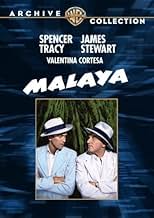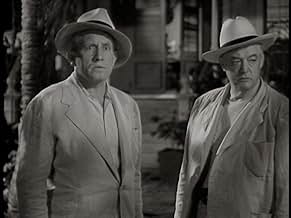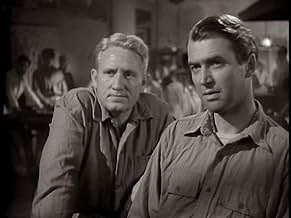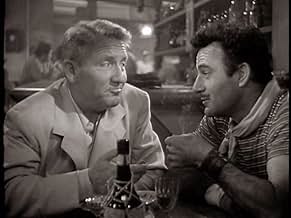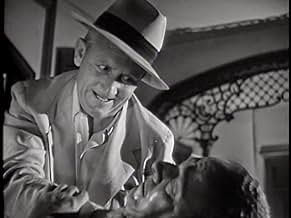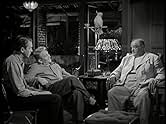NOTE IMDb
6,5/10
1,6 k
MA NOTE
Ajouter une intrigue dans votre langueNewspaperman Royer convinces government officials of a plan to obtain rubber by smuggling it out from under the Japanese. Carnahan is let out of prison to help.Newspaperman Royer convinces government officials of a plan to obtain rubber by smuggling it out from under the Japanese. Carnahan is let out of prison to help.Newspaperman Royer convinces government officials of a plan to obtain rubber by smuggling it out from under the Japanese. Carnahan is let out of prison to help.
- Réalisation
- Scénario
- Casting principal
- Récompenses
- 2 victoires au total
Valentina Cortese
- Luana
- (as Valentina Cortesa)
Lester Matthews
- Matisson
- (scènes coupées)
Joel Allen
- Federal Agent
- (non crédité)
Besmark Auelua
- Henchman
- (non crédité)
George M. Carleton
- Small Businessman
- (non crédité)
Silan Chan
- Malay Girl
- (non crédité)
Spencer Chan
- Chinese Shipmaster
- (non crédité)
Joseph Crehan
- Businessman with Pipe
- (non crédité)
Avis à la une
Spencer Tracy and James Stewart preside over a terrific cast in "Malaya," a 1949 film also starring Valentina Cortese, Sydney Greenstreet, John Hodiak, Lionel Barrymore, Roland Winters and Gilbert Roland.
This is a fictional account of a very real situation involving the shortage of rubber during World War II. Japan really dominated the countries that had the rubber, and there was smuggling of rubber to the U.S. The situation involving Tracy and Stewart, however, never happened.
Tracy plays a con named Carnahan, whom the government releases from Alcatraz in order to spearhead this project, and Stewart plays John Royer, a former reporter with a shady enough past that the government (represented by John Hodiak) thinks he's a good bet to go into Malaya and smuggle tons of rubber out of that country and pay with gold. Carnahan knows the country like the back of his hand and has the connections. He and Royer pose as Irish sailors looking for work in order to get around a suspicious Colonel Tomura (Richard Loo) while they are helped by an old friend of Carnahan's, The Dutchman (Sydney Greenstreet). Cortese has the Dietrich role, that of a singer in love with Carnahan.
There are some exciting scenes in this film, and it holds one's attention. One of the best performances comes from Gilbert Roland, who leads the smugglers handpicked by The Dutchmen. He's very convincing.
As for Tracy and Stewart, well, although Tracy started out in tough guy Wallace Beery roles, 1949 was a little late for him to be taking them up again. Actually Hodiak would have been good, or Bogart, or John Wayne, Jimmy Cagney, someone along those lines. I thought Stewart was very good and that the two of them made an effective team. Someone said he came off as a nice guy. I thought he did cynic and hardboiled well. You can be cynical and hardboiled and averse to physical violence.
All in all, pretty good.
This is a fictional account of a very real situation involving the shortage of rubber during World War II. Japan really dominated the countries that had the rubber, and there was smuggling of rubber to the U.S. The situation involving Tracy and Stewart, however, never happened.
Tracy plays a con named Carnahan, whom the government releases from Alcatraz in order to spearhead this project, and Stewart plays John Royer, a former reporter with a shady enough past that the government (represented by John Hodiak) thinks he's a good bet to go into Malaya and smuggle tons of rubber out of that country and pay with gold. Carnahan knows the country like the back of his hand and has the connections. He and Royer pose as Irish sailors looking for work in order to get around a suspicious Colonel Tomura (Richard Loo) while they are helped by an old friend of Carnahan's, The Dutchman (Sydney Greenstreet). Cortese has the Dietrich role, that of a singer in love with Carnahan.
There are some exciting scenes in this film, and it holds one's attention. One of the best performances comes from Gilbert Roland, who leads the smugglers handpicked by The Dutchmen. He's very convincing.
As for Tracy and Stewart, well, although Tracy started out in tough guy Wallace Beery roles, 1949 was a little late for him to be taking them up again. Actually Hodiak would have been good, or Bogart, or John Wayne, Jimmy Cagney, someone along those lines. I thought Stewart was very good and that the two of them made an effective team. Someone said he came off as a nice guy. I thought he did cynic and hardboiled well. You can be cynical and hardboiled and averse to physical violence.
All in all, pretty good.
This film has some really great actors in it - Sydney Greenstreet, Spencer Tracey, Lionel Barrymore, James Stewart, Gilbert Roland, John Hodiak, Richard Loo, etc. And it's got an exotic location (Malaya) and a war-time plot (getting rubber to outfit the US war machine in WW2). But it never manages to get going, maybe because Spencer Tracey was never really an "action" star, or maybe because the director Richard Thorpe, while prolific, wasn't particularly skilled in this genre (he's best known for Ivanhoe, Knights of the Round Table, The Great Caruso, The Student Prince).
It's worth a look, and Barrymore and Greenstreet do their usual wonderful jobs.
It's worth a look, and Barrymore and Greenstreet do their usual wonderful jobs.
Malaya may seem a fantastic tale, but the story actually has quite a bit of truth to it. When World War II broke out the Japanese quickly conquered most of the rubber producing areas of the world. The modern mechanized army does run on rubber and both the USA and Germany developed types of synthetic rubber to be used.
My mother told me during World War II there were all kinds of drives for recyclable material and among the most valuable was rubber. People contributed all kinds of old tires for the war effort.
Lionel Barrymore plays the real life Manchester Boddy who was publisher of the Los Angeles Daily News who was the prime mover in the scheme you see portrayed here in Malaya. Though this story is fictional, the need for rubber in the USA was critical at the time and there was in fact a rubber smuggling operation going on.
Spencer Tracy before he came to MGM played just the kind of two fisted action heroes at Fox which was his original studio. He expressed an interest in doing this kind of film for old time sake and got cast in it. He really isn't poaching on Humphrey Bogart's territory these were the kind of roles he originally did in film while Bogey was playing hoods over at Warner Brothers.
Because the script called for a buddy team of heroes, James Stewart was approached and he even conceded top billing to Tracy. According to the Films of James Stewart, he admired Tracy as an actor so much that he was grateful just for the opportunity to work with him again. In fact Stewart's first film role was in Murder Man, a film that starred Spencer Tracy back in 1935.
With the two of these big stars in the leads, MGM was able to recruit a really outstanding group of players like John Hodiak, Valentina Cortese, Roland Winters, Richard Loo, the aforementioned Lionel Barrymore and my two favorites Gilbert Roland and Sydney Greenstreet.
Roland was shortchanged though. Watching Malaya I could tell his role as Tracy's adventurous friend was left on the cutting room floor. But even a little Gilbert Roland is always a pleasure to watch.
This was Sydney Greenstreet's last film and in it he essentially reprises the part of Ferrari in Casablanca. He's got the best lines in the film and his scenes with his cockatoo are classic. As he says, he's just a saloon keeper with an access to gossip. Which gets put to very good use.
Stewart the idealist, Tracy the cynical realist. Too bad they didn't work together more.
My mother told me during World War II there were all kinds of drives for recyclable material and among the most valuable was rubber. People contributed all kinds of old tires for the war effort.
Lionel Barrymore plays the real life Manchester Boddy who was publisher of the Los Angeles Daily News who was the prime mover in the scheme you see portrayed here in Malaya. Though this story is fictional, the need for rubber in the USA was critical at the time and there was in fact a rubber smuggling operation going on.
Spencer Tracy before he came to MGM played just the kind of two fisted action heroes at Fox which was his original studio. He expressed an interest in doing this kind of film for old time sake and got cast in it. He really isn't poaching on Humphrey Bogart's territory these were the kind of roles he originally did in film while Bogey was playing hoods over at Warner Brothers.
Because the script called for a buddy team of heroes, James Stewart was approached and he even conceded top billing to Tracy. According to the Films of James Stewart, he admired Tracy as an actor so much that he was grateful just for the opportunity to work with him again. In fact Stewart's first film role was in Murder Man, a film that starred Spencer Tracy back in 1935.
With the two of these big stars in the leads, MGM was able to recruit a really outstanding group of players like John Hodiak, Valentina Cortese, Roland Winters, Richard Loo, the aforementioned Lionel Barrymore and my two favorites Gilbert Roland and Sydney Greenstreet.
Roland was shortchanged though. Watching Malaya I could tell his role as Tracy's adventurous friend was left on the cutting room floor. But even a little Gilbert Roland is always a pleasure to watch.
This was Sydney Greenstreet's last film and in it he essentially reprises the part of Ferrari in Casablanca. He's got the best lines in the film and his scenes with his cockatoo are classic. As he says, he's just a saloon keeper with an access to gossip. Which gets put to very good use.
Stewart the idealist, Tracy the cynical realist. Too bad they didn't work together more.
There is a scene that makes the whole picture worthwhile (although it is otherwise pretty ordinary):
Sydney GREENSTREET is entering a room after app. 2/3 of the movie, where Spencery Tracey has just been "treated kindly" in an "interview", Greenstreet is sweating (as always), sitting down and looking at the molestor of Tracy, then says (roughly): "If you say this was necessary, then of course it was necessary, but wasn't that much for a bottle of poor booze?". The officer say: "But he broke our rules". Greenstreet: "A man who drinks and then doesn't break any rules is no man. Drinking and making troubles goes together, this is also a rule." What a line !! Officer: "I love your logic." Of course these are not exactly the lines from the picture, cause I saw the German dubbed version and re-translated them, but they can only be better in the English version.
Hilarious! Tape it, when shown on TV next time and get to that scene, it is just great!
Sydney GREENSTREET is entering a room after app. 2/3 of the movie, where Spencery Tracey has just been "treated kindly" in an "interview", Greenstreet is sweating (as always), sitting down and looking at the molestor of Tracy, then says (roughly): "If you say this was necessary, then of course it was necessary, but wasn't that much for a bottle of poor booze?". The officer say: "But he broke our rules". Greenstreet: "A man who drinks and then doesn't break any rules is no man. Drinking and making troubles goes together, this is also a rule." What a line !! Officer: "I love your logic." Of course these are not exactly the lines from the picture, cause I saw the German dubbed version and re-translated them, but they can only be better in the English version.
Hilarious! Tape it, when shown on TV next time and get to that scene, it is just great!
Even with a better cast, this would not have been much of a film. On the surface it looks like it will be some sort of action film, with spies going into enemy territory to steal, or rather negotiate on the black market for, essential supplies. But there's little intrigue and very little action. Most of the scenes are simply characters sitting in chairs talking to one another. The surprise at the very end of the film is so far-fetched as to undercut the credibility of nearly everything else. The love story involves two people who have no reason to be attracted to one another. There are elements of Casablanca here, set in a country occupied by the enemy, a nightclub owner consorting with an enemy officer, the gambling being fixed by the owner to pay someone he wants to do a favour to, and a cynic acquiring higher ideals; but it's all a very pale imitation of Casablanca. Some comments suggest that there is something "noirish" about the film. Well. it's in black and white, but it does not have the requisite sense of evil and foreboding.
But the biggest failure is in the casting. James Stewart is supposed to play a sour, hard-bitten, cynical operator who finds a little patriotism late in life. But Stewart can't help coming across as a nice guy. He may speak the tough words, but the tone is wrong. His eyes shift in that self-deprecating way of his, he carries himself in that modest way of his, and he just doesn't come off as the character he is supposed to be playing. When his partner is punching someone over and over in the face, Stewart looks repelled by the brutality. Spencer Tracy is probably even worse in his role as a tough jailbird who is let out of Alcatraz to help in the mission. He looks old; his figure is dumpy, his way of moving is slow. He threatens a man, but he doesn't seem very scary. (DeNiro would know how to do that.) He is the romantic interest of a nightclub singer who is crazy over him, yet he's way too old for her and doesn't have anything of the sort of animal magnetism that might make him believable as her lover. In fact, to be honest, there were moments when Tracy looked like he couldn't act. The Japanese have been beating him, trying to get him to talk; Tracy frowns a little but registers no pain, no discomfort, no fear; he shakes it off and then looks comfortable. When he dumps his girlfriend to keep her safe, his face shows nothing.
I forced myself to watch to the end because I have an interest in Malaya. On its own terms, this movie would have lost me long before the mid-way point.
But the biggest failure is in the casting. James Stewart is supposed to play a sour, hard-bitten, cynical operator who finds a little patriotism late in life. But Stewart can't help coming across as a nice guy. He may speak the tough words, but the tone is wrong. His eyes shift in that self-deprecating way of his, he carries himself in that modest way of his, and he just doesn't come off as the character he is supposed to be playing. When his partner is punching someone over and over in the face, Stewart looks repelled by the brutality. Spencer Tracy is probably even worse in his role as a tough jailbird who is let out of Alcatraz to help in the mission. He looks old; his figure is dumpy, his way of moving is slow. He threatens a man, but he doesn't seem very scary. (DeNiro would know how to do that.) He is the romantic interest of a nightclub singer who is crazy over him, yet he's way too old for her and doesn't have anything of the sort of animal magnetism that might make him believable as her lover. In fact, to be honest, there were moments when Tracy looked like he couldn't act. The Japanese have been beating him, trying to get him to talk; Tracy frowns a little but registers no pain, no discomfort, no fear; he shakes it off and then looks comfortable. When he dumps his girlfriend to keep her safe, his face shows nothing.
I forced myself to watch to the end because I have an interest in Malaya. On its own terms, this movie would have lost me long before the mid-way point.
Le saviez-vous
- AnecdotesSydney Greenstreet's final film.
- GaffesOne scene features wild chimpanzees. Chimps are natives of Africa, not Malaya.
- Citations
John Royer: You have to remember, this guy's a German.
Carnaghan: Yeah, but he's a greedy man, and greed has a nationality all its own.
- ConnexionsEdited from Les sacrifiés (1945)
- Bandes originalesBlue Moon
(uncredited)
Written by Richard Rodgers and Lorenz Hart
Performed by Valentina Cortese (as 'Luana'), also whistled by James Stewart
Meilleurs choix
Connectez-vous pour évaluer et suivre la liste de favoris afin de recevoir des recommandations personnalisées
- How long is Malaya?Alimenté par Alexa
Détails
- Date de sortie
- Pays d’origine
- Langue
- Aussi connu sous le nom de
- Operation Malaya
- Lieux de tournage
- Société de production
- Voir plus de crédits d'entreprise sur IMDbPro
Box-office
- Budget
- 2 396 000 $US (estimé)
- Durée1 heure 38 minutes
- Couleur
- Rapport de forme
- 1.37 : 1
Contribuer à cette page
Suggérer une modification ou ajouter du contenu manquant


